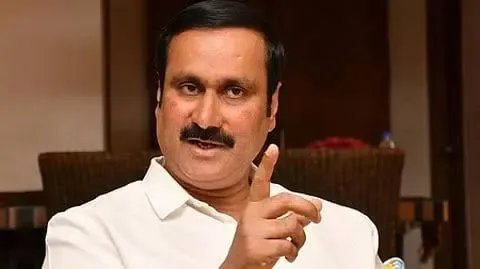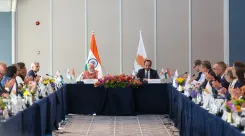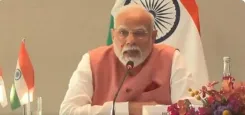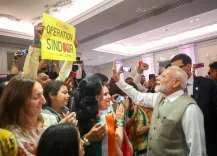Will PMK Leader Anbumani Ramadoss Help Form a Coalition Government in Tamil Nadu After Next Year's Polls?

Synopsis
Key Takeaways
- PMK's pivotal role in Tamil Nadu's coalition government.
- Commitment to social justice and grassroots mobilization.
- Historical influence on OBC reservation policies.
- Internal party dynamics and leadership challenges.
- Shift in political landscape ahead of 2026 elections.
Chennai, June 15 (NationPress) Dr. Anbumani Ramadoss, the leader of the Pattali Makkal Katchi (PMK), expressed optimism on Sunday that a coalition government will be established in Tamil Nadu following the 2026 Assembly elections, with his party playing a crucial role.
During a district-level general council meeting in Tiruvallur, the former Union Health Minister emphasized that PMK is diligently preparing for the elections through grassroots outreach and engaging youth. “A coalition government will emerge in Tamil Nadu next year, and PMK will be an integral part of that alliance. We were not established to assist either the DMK or the AIADMK in forming administrations,” Anbumani stated, making it clear that his party is setting itself apart from the two leading Dravidian parties without direct mention.
He called for a fresh political alternative in Tamil Nadu, asserting that true social justice can only be realized when PMK holds power. “We should govern as well. Only then can we guarantee social justice for our people. We desire nothing else,” he affirmed, reiterating the party’s long-standing ideological stance. Anbumani recalled how PMK played a pivotal role in securing 27 percent reservation for Other Backward Classes (OBCs) in central government educational institutions during the UPA-I government in 2004.
“It was PMK that advocated for OBC reservation to be included in the Common Minimum Programme of UPA. However, when the implementation faced a two-year delay, our founder, Dr. S. Ramadoss, cautioned that the party would exit the alliance unless the commitment was honored. It was only after that the promise was realized,” he stated, adding, “This exemplifies coalition politics—this is what Tamil Nadu requires.”
This statement comes amidst rising tensions between Anbumani and his father, PMK founder Dr. S. Ramadoss.
After the 2021 Assembly elections, ideological rifts and strategic differences between the two became apparent, with reports indicating that Ramadoss Sr. was critical of certain decisions made by Anbumani regarding alliances and internal leadership changes. While these differences have not been publicly discussed, the younger Ramadoss has recently adopted a more assertive approach, signaling a shift in the party’s political direction. Despite these internal disagreements, Anbumani’s address in Tiruvallur seemed aimed at fostering party unity and gearing up the cadre for an impactful political contest ahead.
“We are organizing these district-level meetings to fortify the party structure, reach every village, and attract more youth. The groundwork for transformation is in progress,” he said.
As Tamil Nadu's political landscape potentially shifts in anticipation of 2026, Anbumani’s advocacy for coalition governance represents a renewed endeavor by PMK to position itself as a pivotal player—if not a principal ruling partner—in the state.






